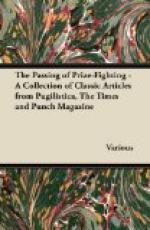It was night. Eugene was in possession of the stage when I began to take an interest in the romance. I cannot say for how long he had serenaded his divinity before I became conscious of his lay, but I do know that thereafter he put in one and a half hours of good solid craking before he desisted. I then felt grateful for the silence, rolled over and prepared to get on with my postponed slumber.
But Strong-i’-th’-lung decreed otherwise. With a contemptuous snort at his rival’s performance he opened his epic. He was splendid. For one and three-ninths hours he descanted on the glories of field life, on the freshness of the night, on the brilliance of the June foliage; for the next two hours he ardently proclaimed the surpassing beauty of Thisbe’s eye, the glossiness of her plumage, the neatness of her claw, and he wound up with a mad twenty minutes of piercing monotony as he depicted the depth of his devotion for her.
When he ceased, in a silence which was almost deafening, I could visualise Thisbe dimpling with satisfaction and undoubtedly filled with tenderness toward a lover capable of expressing himself so eloquently. I turned over with a sigh of relief and closed my eyes in pleasurable anticipation of rest.
But Eugene felt it necessary to reply. I think his intention was to crake disbelief of his rival’s sincerity, to throw cold water on his burning professions, perhaps even to question the excellence of his intentions. But his nerve was obviously shaken by his competitor’s undoubtedly fine performance, and he craked indecisively. At 4.30 a.m. I distinctly heard him utter a flat note. At 4.47 he missed the second part of a bar entirely. Thisbe’s beak, I must believe, curled derisively; Strong-i’-th’-lung laughed contemptuously, and at 5.10 a.m. Eugene faltered, stammered and fled from the field defeated.
The sequel I have had to build up on rather fragmentary data, but it appears that Eugene fled as far as Pudberry Parva, and endeavoured to cool his discomfiture in a dewy hayfield.
To him there came an old crone, the “father and mother” of all corncrakes, who comforted him, cossetted him, and from a fund of deep experience offered him hints on voice production. She also gave him of a nostrum of toadwort and garlic, which mollified his lacerated chords, and she prescribed massage of the throat by rubbing against a young beech stem.
Within two days Eugene was back in my field. In tones that feigned to falter he craked a few bars to open the performance. Strong-i’-th’-lung at once rose full of pitying confidence and craked for two and a half hours the song of the practically accepted suitor. It was a good song, and Thisbe seemed pleased, though I fancy she rather resented the note of assurance which he imparted to his ballad.
Then Eugene came on. Bearing well in mind all the instruction of his recent benefactress, he commenced at 11.45 p.m. such a masterpiece as has never before been heard in the bird world. His consistency of period was masterly, his iteration superb and his even monotony incomparable. Crake succeeded crake with dull regular inevitability. So far as I know he carried his bat. He was still playing strongly when I fell on a troubled sleep about 5.30....




